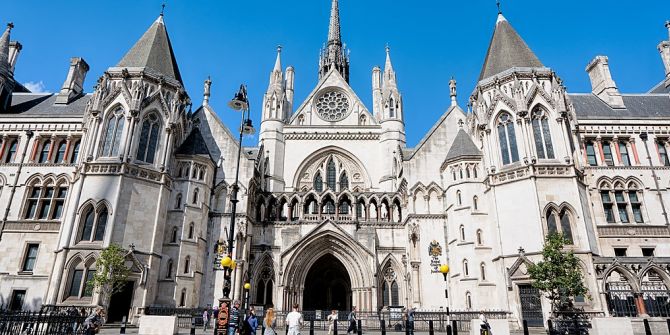As the majority of Muslim marriages in England are not legally recognised, women are in a particularly vulnerable position should those marriages break down. However, in one recent case a judge’s novel application of article 8 of the European Convention has opened the door for the wife to seek some financial recourse. Alistair Jones perceives this to be a significant development which is likely to be welcomed by campaigners. Yet he also highlights the difficulties that remain, stressing that legal solutions have their limits and that theological reform is ultimately required if a lasting solution is to be found.

The majority of Muslim marriages in England would not be recognised in the English courts. Typically, Muslim couples celebrate a traditional Nikah marriage ceremony but often they do not then go on to register the marriage as a civil marriage. According to one survey from 2014, as many as 9 out of 10 women in some parts of the UK have ‘Nikah-only’ marriages. These marriages have religious meaning but no legal status. They exist in sharia law, but not in English civil law.
The consequences may be drastic if the marriages fall apart. A Muslim woman who has had a Nikah-only marriage and divorces won’t be able to go to the family court for maintenance and a share of the family home. She is likely to be advised by a lawyer that she was, in effect, never married in the eyes of English law. She would have no more rights than a girlfriend and so may well be left without any financial support.
For a few years, Muslims, feminists, secularists and others have been drawing attention to this hardship. Earlier this year the Home Office published a review which addressed the issue. The principal recommendation was that legal changes should be introduced to ensure that Muslim couples also register their marriages as civil marriages. The aim was to protect women in Nikah-only marriages. But legislative change has not yet followed and it is worth wondering if it will.
In the meantime, an interesting legal development for married Muslim women in England did come about a few weeks ago. It was little noticed, but may have more effect than the review. It took the form of a judgement handed down by Mr Justice Williams in the family court in London, in the case of Nasreen Akhter v Mohammed Shabaz Khan.
When Nasreen Akhter petitioned for divorce, her husband’s defence was predictable. He said they had never entered a marriage that was valid according to English law. Indeed, a Nikah had been celebrated at TKC Chowdury’s restaurant in Southall but, he said, the marriage existed only in sharia law. Therefore a divorce in the English courts was just a legal impossibility. His wife was entitled to nothing.
The court agreed with the husband that the marriage was not valid. However, instead of simply declaring that the marriage was (in the chilling phrase) a “non-marriage”, Mr Justice Williams then took a different tack. He found that it was “void” for the purposes of section 11 of the Matrimonial Causes Act 1973. To a non-lawyer, the difference between a “non-marriage” and a “void” marriage is likely to sound like splitting hairs. In fact, it is crucial.
A “non-marriage” never existed. Such a marriage is treated as though it was some other kind of relationship: boyfriend and girlfriend, partners or what-have-you. A person in a “void” marriage can, by contrast, still apply to the court to deal with maintenance and to divide assets like the family home. By saying that a Nikah-only marriage was “void”, the judge gave the wife some of the same rights as a couple who had been validly married all along, even though the marriage had never been registered.
Mr Justice Williams’ judgement was surprising. How did we get here?
It was through a novel application of human rights law. The judge interpreted the right to respect for one’s “private and family life” (article 8 of the European Convention) in an expansive way to grant the wife her petition. This kind of ruling is possible because of the way that rights under the European Convention are interpreted. The Convention is understood as a “living instrument” which must be interpreted “in the light of present day conditions”. To put it crudely, a judge may derive new law from an “interpretation” of the very broad convention rights.
The decision represents a bold step in the protection of Muslim women who might otherwise find themselves abandoned and penniless. All the same, the judgement has its problems.
The position of women in Nikah-only marriages remains far from certain. The judge decided this case “on its particular facts”. That means not everyone in a similar predicament can expect the same treatment. Much will depend on the circumstances.
The bigger question is whether it is desirable for a judge to make this kind of decision. You may agree with the decision but disagree about the way it was made.
Mr Justice Williams may have altered a key notion of Islamic marriage in England. Traditionally, a Muslim husband may repudiate his wife without any reference to a legal tribunal. In many Islamic traditions, a man has only to say “I divorce you” three times in order to obtain a divorce (a Talaq). If Mr Justice Williams’ judgement has wider application, a Talaq would no longer be possible.
If certain religious practices are deemed to be unacceptable, who should say so? Decisions made in the High Court are made by a single legal professional acting on his or her own. Do we want a solitary judge to decide difficult and rangey questions of public policy?
Parliament would be the more natural forum. Laws that pass through Parliament are given the kind of scrutiny that a judge could never give. They involve democratic accountability and policy considerations that are much broader than can feature in the necessarily narrow process of litigation. Politicians should not abandon matters of significant public policy to the courts which aren’t equipped to deal with them.
But perhaps neither Parliament nor the courts are the main answer. Not every decision is primarily a decision for law-makers. The state has a duty to protect the vulnerable, but the law also has its limits. Islamic teaching on divorce is a matter of theology. These days theology is regarded as an irrelevance. It is a bit of a Cinderella subject. But the particulars of faith can only be reordered in the language of a living tradition. The fundamental issue is a question of what should be taught about divine truth and human traditions.
Note: This piece gives the views of the author, and not the position of the LSE Religion and Global Society blog, nor of the London School of Economics.






Good aticel i am imprressed
Thanks for sharing